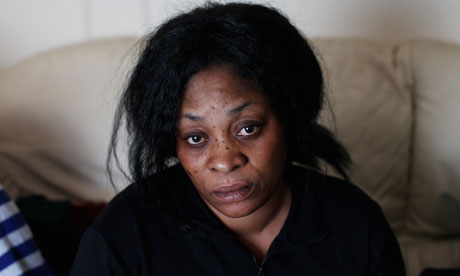http://t.co/vByXeYU

Jimmy Mubenga's widow, Makenda Kambana. She is supporting moves to investigate his death. Photograph: Graeme Robertson
The United Nations special rapporteur on torture is being asked to examine the circumstances surrounding the death of an Angolan man who collapsed while being deported on a commercial flight from Heathrow.
Campaigners are sending a file on Jimmy Mubenga to the UN and each member of the Commons home affairs select committee, calling for a comprehensive review of the way people are deported from the UK.
Deborah Coles, of the Inquest charity, said: "Given the profound human rights issues that this case raises we felt we needed to put pressure not only on parliament but also on the UN so that these issues are examined properly by the state and international human rights mechanisms to ensure enforceable and accountable learning."
Mubenga collapsed and died as he was being deported on a commercial flight from Heathrow in October. Passengers told police they saw three G4S security guards heavily restraining Mubenga, who they said had been complaining of breathing difficulties before he collapsed. The guards were later arrested in connection with the death and have been bailed until 4 May.
However, campaigners fear any legal process could take months or even years to complete and warn that there needs to be a comprehensive review of UK deportations to prevent a further tragedy.
Mubenga's wife, Adrienne Makenda Kambana, who lives in east London with the couple's five children, said she was supporting the move.
"Jimmy was a loving and caring father and husband. My children and I don't understand why he was being deported ... We don't want this to happen to anyone else. We want to know how and why this happened to Jimmy. Why did he die?"
The file is being sent to UN special rapporteurs on extra-judicial summary executions, torture and contemporary forms of racism as well as the Council of Europe's committee on the prevention of torture.
Coles said: "The legal processes underway will mean that the systemic issues raised by this death will not be dealt with in a comprehensive or holistic way for a very long time thus frustrating the learning process and the risk of further deaths."
Earlier this year four G4S whistleblowers submitted evidence to the home affairs committee, obtained by the Guardian, that alleged serious failings by G4S. It also contradicted some of what senior G4S officials told MPs at a hearing after Mubenga's death.
Police have interviewed three of the whistleblowers who included a G4S charter operations manager who said he warned seniors they risked "playing russian roulette with detainees' lives".
Detectives are also seeking to track down other individuals from G4S known to have concerns about safety standards and training at the company.
Keith Vaz, the Labour MP who chairs the home affairs committee, said the possibility that whistleblower evidence could assist the police investigation represented progress. The committee has yet to decide whether to recall the G4S officials or hold further evidence sessions.
Campaigners are sending a file on Jimmy Mubenga to the UN and each member of the Commons home affairs select committee, calling for a comprehensive review of the way people are deported from the UK.
Deborah Coles, of the Inquest charity, said: "Given the profound human rights issues that this case raises we felt we needed to put pressure not only on parliament but also on the UN so that these issues are examined properly by the state and international human rights mechanisms to ensure enforceable and accountable learning."
Mubenga collapsed and died as he was being deported on a commercial flight from Heathrow in October. Passengers told police they saw three G4S security guards heavily restraining Mubenga, who they said had been complaining of breathing difficulties before he collapsed. The guards were later arrested in connection with the death and have been bailed until 4 May.
However, campaigners fear any legal process could take months or even years to complete and warn that there needs to be a comprehensive review of UK deportations to prevent a further tragedy.
Mubenga's wife, Adrienne Makenda Kambana, who lives in east London with the couple's five children, said she was supporting the move.
"Jimmy was a loving and caring father and husband. My children and I don't understand why he was being deported ... We don't want this to happen to anyone else. We want to know how and why this happened to Jimmy. Why did he die?"
The file is being sent to UN special rapporteurs on extra-judicial summary executions, torture and contemporary forms of racism as well as the Council of Europe's committee on the prevention of torture.
Coles said: "The legal processes underway will mean that the systemic issues raised by this death will not be dealt with in a comprehensive or holistic way for a very long time thus frustrating the learning process and the risk of further deaths."
Earlier this year four G4S whistleblowers submitted evidence to the home affairs committee, obtained by the Guardian, that alleged serious failings by G4S. It also contradicted some of what senior G4S officials told MPs at a hearing after Mubenga's death.
Police have interviewed three of the whistleblowers who included a G4S charter operations manager who said he warned seniors they risked "playing russian roulette with detainees' lives".
Detectives are also seeking to track down other individuals from G4S known to have concerns about safety standards and training at the company.
Keith Vaz, the Labour MP who chairs the home affairs committee, said the possibility that whistleblower evidence could assist the police investigation represented progress. The committee has yet to decide whether to recall the G4S officials or hold further evidence sessions.

No comments:
Post a Comment